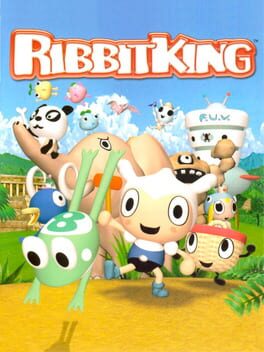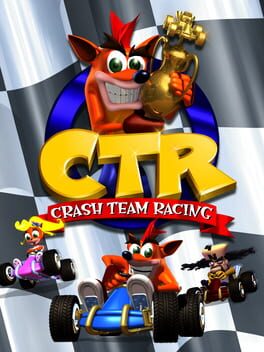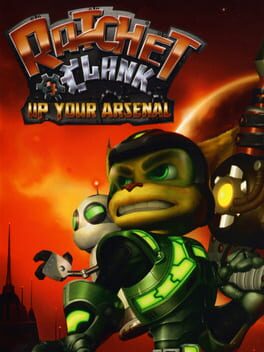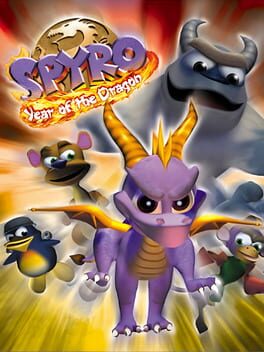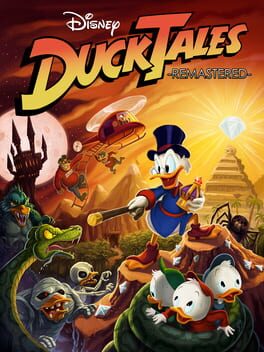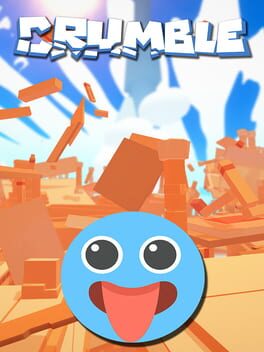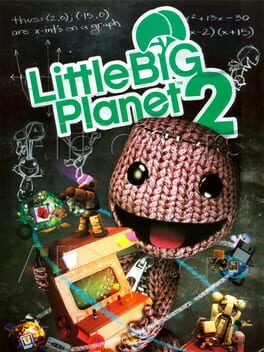Plokster
Bio
Cartoonist / programmer. He / him. Surprisingly, my name is not based on Plok!
Cartoonist / programmer. He / him. Surprisingly, my name is not based on Plok!
Badges

1 Years of Service
Being part of the Backloggd community for 1 year

Listed
Created 10+ public lists

GOTY '23
Participated in the 2023 Game of the Year Event

Elite Gamer
Played 500+ games

Shreked
Found the secret ogre page

Best Friends
Become mutual friends with at least 3 others

Roadtrip
Voted for at least 3 features on the roadmap

Liked
Gained 10+ total review likes

Noticed
Gained 3+ followers

Gone Gold
Received 5+ likes on a review while featured on the front page

Gamer
Played 250+ games

N00b
Played 100+ games
Favorite Games
628
Total Games Played
000
Played in 2024
100
Games Backloggd
Recently Reviewed See More
As someone who doesn’t really have nostalgia for DuckTales or the original game, DuckTales Remastered is definitely one of the better licensed games out there.
Honestly I’m pretty lukewarm when it comes to the Shantae series, but Shantae at the very least tends to have very fluid animation and well-drawn characters. WayForward brings that same skill and enthusiasm to DuckTales Remastered, perfectly translating the character designs from the original game and TV show to work in a modern video game.
For the actual game itself, it can feel the tiniest bit stiff but it’s a big improvement over the original. The levels are visually easier to navigate and all the secrets remain intact. As a whole, you can complete it in about an hour or two. If you found the original game too difficult, Remastered has difficulty modes. Easy mode has no lives and the hardest difficulty, Extreme, has to be completed in one sitting. All other settings in between introduce lives and remove health upgrades along the way.
As for presentation, Remastered has a lot of great aspects. First and foremost, Shovel Knight composer Jake Kauffman did the original soundtrack justice, as each and every track is on-par with the original. Additionally, every cutscene is fully voice acted with most of the original TV show actors reprising their roles, which adds a nice touch. For the visuals, the style is almost indirectly reminiscent of Paper Mario, with paper-thin characters traversing a 3D-rendered environment. Outside of the main gameplay, you can use the money you collect to purchase concept art from both the game and even the TV production. They have artwork for every character in the game, all enemies included. The gallery even contains the original spritework and music for direct comparison, which I really appreciate.
Overall, DuckTales Remastered is a really nice remake. It won’t blow your mind, but it does a good job of bringing a classic NES game to the modern era and remains one of the few remakes I’ll gladly play over the original.
Honestly I’m pretty lukewarm when it comes to the Shantae series, but Shantae at the very least tends to have very fluid animation and well-drawn characters. WayForward brings that same skill and enthusiasm to DuckTales Remastered, perfectly translating the character designs from the original game and TV show to work in a modern video game.
For the actual game itself, it can feel the tiniest bit stiff but it’s a big improvement over the original. The levels are visually easier to navigate and all the secrets remain intact. As a whole, you can complete it in about an hour or two. If you found the original game too difficult, Remastered has difficulty modes. Easy mode has no lives and the hardest difficulty, Extreme, has to be completed in one sitting. All other settings in between introduce lives and remove health upgrades along the way.
As for presentation, Remastered has a lot of great aspects. First and foremost, Shovel Knight composer Jake Kauffman did the original soundtrack justice, as each and every track is on-par with the original. Additionally, every cutscene is fully voice acted with most of the original TV show actors reprising their roles, which adds a nice touch. For the visuals, the style is almost indirectly reminiscent of Paper Mario, with paper-thin characters traversing a 3D-rendered environment. Outside of the main gameplay, you can use the money you collect to purchase concept art from both the game and even the TV production. They have artwork for every character in the game, all enemies included. The gallery even contains the original spritework and music for direct comparison, which I really appreciate.
Overall, DuckTales Remastered is a really nice remake. It won’t blow your mind, but it does a good job of bringing a classic NES game to the modern era and remains one of the few remakes I’ll gladly play over the original.
As far as I remember, this game was created on the concept of levels that fall apart as you play them (hence the name, Crumble). Combine this with the idea of using a grappling hook as your main method of traversal and it sounds like you would have something interesting. From my time with it though, I can't really tell what this game wants to be.
As it currently stands, it feels like it wants to be a goofy physics simulator while simultaneously wanting to be a precision platformer based around speed. If you have a lot of patience, a challenge like that may sound interesting. However, I feel that for the average player (or even the above-average player), the unpredictability of the physics and the grapple-tongue leads to a game that doesn't feel very satisfying to play. If you don't have a grappling point directly above you, you have no idea where your grapple will latch onto. As a result, it instantly kills your momentum in most situations. In a frenzy to save yourself, you'll begin attempting to climb the walls by swinging back and forth, only to realize this straight up doesn't work the vast majority of the time.
Aside from most of the levels being forgettable, there are genuinely some cool ideas and mechanics on display here and there. In the brief moments where you're going full speed and making split-second decisions, it feels awesome! I think with some adjustments and more focus, it could be a more enjoyable experience. For example, I feel having a grapple-assist that locks on to very specific points could go a long way.
Also, I took off half a star because while I was looking up info for this game, I couldn't help but notice the publisher seems to be obsessed with NFTs.
As it currently stands, it feels like it wants to be a goofy physics simulator while simultaneously wanting to be a precision platformer based around speed. If you have a lot of patience, a challenge like that may sound interesting. However, I feel that for the average player (or even the above-average player), the unpredictability of the physics and the grapple-tongue leads to a game that doesn't feel very satisfying to play. If you don't have a grappling point directly above you, you have no idea where your grapple will latch onto. As a result, it instantly kills your momentum in most situations. In a frenzy to save yourself, you'll begin attempting to climb the walls by swinging back and forth, only to realize this straight up doesn't work the vast majority of the time.
Aside from most of the levels being forgettable, there are genuinely some cool ideas and mechanics on display here and there. In the brief moments where you're going full speed and making split-second decisions, it feels awesome! I think with some adjustments and more focus, it could be a more enjoyable experience. For example, I feel having a grapple-assist that locks on to very specific points could go a long way.
Also, I took off half a star because while I was looking up info for this game, I couldn't help but notice the publisher seems to be obsessed with NFTs.
File this one under “Perfect Sequels.”
In the late 2000’s, a magical game called LittleBigPlanet released for the PS3. On the surface, it was a cute 2.5D platformer with a simple Story Mode where you go through themed obstacle courses to make it from point A to point B. The visuals were beautiful and the sense of the world’s grand scale made your tiny hacky-sack person all the more endearing. Everything in the world looked like it was hand-crafted which made it apparent that they wanted you to tap into your imagination to fully enjoy the experience. You got to customize your little SackThing however you wanted and make them emote while you goofed around with your friends. You even got to customize the little ship that your character uses to select the levels you wanted to play.
While all of this was a great foundation, the Story Mode was simply means to an end: the developers wanted YOU to make your own levels like they did. Everything stated above is only a third of the game. Another significant part of the game is the Create Mode, which is the entire point of the hand-crafted theme that the game flaunts. In LBP, players could easily make their own levels using the powerful, yet easy-to-grasp level editor using all the goodies they collected in the Story Mode. The level editor seems overwhelming at first, but literally every aspect has a short tutorial. This might sound tedious, but each tutorial is optional, yet is narrated gently and delightfully by Stephen Fry who makes it fun to listen and learn. Afterward, you could go online and play all sorts of levels made by other users, whether it was a platformer, some sort of roleplaying map, a tech demo, a shark survival, monster truck rallies, fighting games with silly physics, PvP races, and the list goes on. Despite its primitive restrictions, people were capable of making truly magnificent things that wouldn’t seem possible at first glance, like working calculators or tic-tac-toe with an AI. Plus, the general concept of an online UGC video game was pretty novel at the time, especially on a console. Suffice to say, LBP was a fun, impressive game that really wanted you flex your creative muscles.
And then LittleBigPlanet 2 came along and obliterated LBP1 in every single aspect.
LBP2 takes everything that was great about LBP1 and cranks it up to11. Not only were there quality of life improvements across the board, but they did an exceptional job of filling in all the missing bits and pieces that you could possibly ask for. In the level editor, they added Logic Gates, which were little computer chips and other gadgets that gave you far more control over how anything and everything in your levels functioned. No longer did you have to rely on overly-complicated, yet primitive solutions to do something simple, you could just plop down a few Logic Gates and get it done in a minute. Plus, they gave you even more development tools at your disposal to make your levels more like a true video game. Enemies were easier to make, bosses were easier to make, multi-level narratives were easier to make and string together. There were lots of customizable power ups at your disposal that made creating your level around an interesting central mechanic easier. The new Story Mode was far more intricate and advanced than the old one, once again showcasing what was possible in the level editor. You could even make your own custom soundtrack with MIDI-like instruments if you wanted. You had SackBots which were NPCs you can change the behavior for, making them perform specific actions or just speak to the player. You could use a gadget called “the Controlinator” to make advanced vehicles, massive machines, or completely custom characters and bind it to your controller inputs. Players could now make things like Battleship, top-down racers, horror games, puzzles with serious depth, spectacular boss fights, collect-a-thons, survival gauntlets, and so much more. There were even people making feature length films with the new NPC system and cutscene tools, it was absolutely insane. To top it all off, if you had LBP1, you got to transfer EVERYTHING you obtained from LBP1 to LBP2. Music, clothes, building materials, objects, stickers, DLCs, your character’s outfits, everything. The amount of things you could do and how easy it was to build and play was truly mind-blowing. There's no doubt that this game has inspired people to pursue game development in their future.
Truly my only real complaint was the seemingly endless onslaught of DLC. It was cool that you could dress your character like Solid Snake or Ratchet or Jak or even Sonic with official costumes, but the prices would add up sort of quickly. Then there were level kits, where it was fairly common for them to lock an entirely new game mechanic like anti-gravity, wall-jumping, and gliding behind a paywall. By comparison, it was usually more worth it to get level kits, as they would have a small story mode, tons of new materials to work with, new music, a new central game mechanic, and even a few costumes thrown in for only a few bucks. Otherwise, they actually gave out quite a few free things from time to time.
Despite the years of experience between all the developers at Media Molecule, having LBP1 and 2 be their first games after forming a new company is astounding. When you play these games, it’s obvious that so much thought, love, and care went into them. For quite a few years, you could tell when Media Molecule made a game just based on the consistent quality, how detailed everything was and how there tends to be an emphasis on letting your creativity flow. Their mantra for their studio was to keep the amount of staff small so everyone could be tightly-knight and focused, which is a mentality that apparently inspired Hideo Kojima of all people when making his own studio. Their focus certainly shows in their games and LBP2 is easily my favorite game to come from their studio. Quite frankly, it’s also in my top 10 favorite games of the 2010’s.
In the late 2000’s, a magical game called LittleBigPlanet released for the PS3. On the surface, it was a cute 2.5D platformer with a simple Story Mode where you go through themed obstacle courses to make it from point A to point B. The visuals were beautiful and the sense of the world’s grand scale made your tiny hacky-sack person all the more endearing. Everything in the world looked like it was hand-crafted which made it apparent that they wanted you to tap into your imagination to fully enjoy the experience. You got to customize your little SackThing however you wanted and make them emote while you goofed around with your friends. You even got to customize the little ship that your character uses to select the levels you wanted to play.
While all of this was a great foundation, the Story Mode was simply means to an end: the developers wanted YOU to make your own levels like they did. Everything stated above is only a third of the game. Another significant part of the game is the Create Mode, which is the entire point of the hand-crafted theme that the game flaunts. In LBP, players could easily make their own levels using the powerful, yet easy-to-grasp level editor using all the goodies they collected in the Story Mode. The level editor seems overwhelming at first, but literally every aspect has a short tutorial. This might sound tedious, but each tutorial is optional, yet is narrated gently and delightfully by Stephen Fry who makes it fun to listen and learn. Afterward, you could go online and play all sorts of levels made by other users, whether it was a platformer, some sort of roleplaying map, a tech demo, a shark survival, monster truck rallies, fighting games with silly physics, PvP races, and the list goes on. Despite its primitive restrictions, people were capable of making truly magnificent things that wouldn’t seem possible at first glance, like working calculators or tic-tac-toe with an AI. Plus, the general concept of an online UGC video game was pretty novel at the time, especially on a console. Suffice to say, LBP was a fun, impressive game that really wanted you flex your creative muscles.
And then LittleBigPlanet 2 came along and obliterated LBP1 in every single aspect.
LBP2 takes everything that was great about LBP1 and cranks it up to11. Not only were there quality of life improvements across the board, but they did an exceptional job of filling in all the missing bits and pieces that you could possibly ask for. In the level editor, they added Logic Gates, which were little computer chips and other gadgets that gave you far more control over how anything and everything in your levels functioned. No longer did you have to rely on overly-complicated, yet primitive solutions to do something simple, you could just plop down a few Logic Gates and get it done in a minute. Plus, they gave you even more development tools at your disposal to make your levels more like a true video game. Enemies were easier to make, bosses were easier to make, multi-level narratives were easier to make and string together. There were lots of customizable power ups at your disposal that made creating your level around an interesting central mechanic easier. The new Story Mode was far more intricate and advanced than the old one, once again showcasing what was possible in the level editor. You could even make your own custom soundtrack with MIDI-like instruments if you wanted. You had SackBots which were NPCs you can change the behavior for, making them perform specific actions or just speak to the player. You could use a gadget called “the Controlinator” to make advanced vehicles, massive machines, or completely custom characters and bind it to your controller inputs. Players could now make things like Battleship, top-down racers, horror games, puzzles with serious depth, spectacular boss fights, collect-a-thons, survival gauntlets, and so much more. There were even people making feature length films with the new NPC system and cutscene tools, it was absolutely insane. To top it all off, if you had LBP1, you got to transfer EVERYTHING you obtained from LBP1 to LBP2. Music, clothes, building materials, objects, stickers, DLCs, your character’s outfits, everything. The amount of things you could do and how easy it was to build and play was truly mind-blowing. There's no doubt that this game has inspired people to pursue game development in their future.
Truly my only real complaint was the seemingly endless onslaught of DLC. It was cool that you could dress your character like Solid Snake or Ratchet or Jak or even Sonic with official costumes, but the prices would add up sort of quickly. Then there were level kits, where it was fairly common for them to lock an entirely new game mechanic like anti-gravity, wall-jumping, and gliding behind a paywall. By comparison, it was usually more worth it to get level kits, as they would have a small story mode, tons of new materials to work with, new music, a new central game mechanic, and even a few costumes thrown in for only a few bucks. Otherwise, they actually gave out quite a few free things from time to time.
Despite the years of experience between all the developers at Media Molecule, having LBP1 and 2 be their first games after forming a new company is astounding. When you play these games, it’s obvious that so much thought, love, and care went into them. For quite a few years, you could tell when Media Molecule made a game just based on the consistent quality, how detailed everything was and how there tends to be an emphasis on letting your creativity flow. Their mantra for their studio was to keep the amount of staff small so everyone could be tightly-knight and focused, which is a mentality that apparently inspired Hideo Kojima of all people when making his own studio. Their focus certainly shows in their games and LBP2 is easily my favorite game to come from their studio. Quite frankly, it’s also in my top 10 favorite games of the 2010’s.
